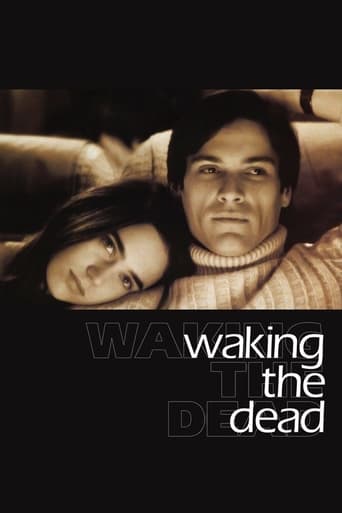SnoopyStyle
It's 1974. Fielding Pierce (Billy Crudup) watches a TV report of a bombing in Minneapolis killing his activist love Sarah Williams (Jennifer Connelly) along with Chilean dissidents. They met two years earlier in NYC. He was in the Coast Guard avoiding the war. She was working for his brother's leftist paper. In 1982 Chicago, Fielding is a county prosecutor recruited to run for Congress. He starts to wonder if Sarah is truly dead.There may be an intriguing romantic political drama somewhere here but the jumping around in time disrupts any flow. The movie is terribly disjointed. Crudup and Connelly could have generated great chemistry but they don't have the consistent screen time together. The tension struggles. There is a nice haunted feel and this definitely has the promise of a compelling story but the jumping around tired me out.
PeachHamBeach
CAUTION: SPOILERSThis movie had me in tears just about every 2 minutes at least. While a young man maps out his ambitions for the future, he meets a woman who sees the world with eyes that are similar to his, but a bit more outspoken. They fall in love, and would be the perfect couple if not for their conflicting political views and family traditions. While Fielding (a beautiful Kleenex-box devouring performance by Billy Crudup) works for the Coast Guard and then thru law school, Sarah (an equally wonderful Jennifer Connelly) is an independent Peace-Corps worker of sorts, working for the Catholic church in different and dangerous situations that take her far from home into hotbeds of political strife. Fielding's life is shattered when Sarah and 2 Chilean diplomats are killed in a car bomb in 1973. For the next decade, he tries to move on without her, and presses on until he becomes a candidate for public office. Suddenly, he begins to...hallucinate? Dream? Have visions? of the woman he loved. He begins to believe he is losing his mind, and it affects his campaign. The one thing that confuses me and kind of pees me off is when Sarah suddenly seems to reappear for real, first via phone call and second, with a surprise visit. She apologizes for hurting him, and if what she's saying is true, she really did nearly kill him by faking her death. Did she fake her death because of the Chilean Resistance? Or did she want out of the relationship because though they love each other, their beliefs and politics don't match. Fielding wakes up the morning after this cryptic 'visit' and wonders if even this was a reverie. But somehow, the fact that he never has visions or hallucinations of weird phone calls ever again, says to me, Sarah had been alive all these years and had faked her death for one reason or another. I really should watch this again to get a better clarity on exactly what her motives were, but I cried so much that I don't think I can go through this again. The one consolation is that Fielding won the election and began to help make a difference in people's lives. Sarah influenced him in a major way, but I was so sad to see that they couldn't have a life together working side by side.
Raul Faust
This is the reason why I give unknown movies a try-- they sometimes simply end up surprising me! "Waking the Dead" is a strong and dramatic romance, which shows everything a man passes through when he loses the one he really loves. The main character is apparently a common guy, but once his girlfriend dies (or not), everything goes downhill. He inadvertently sees her everywhere, with voices and images in his mind. There is a point in the movie we don't know if Pierce is insane or if her girlfriend isn't dead at all-- an Elvis Presley resemblance maybe. In the first half hour of the movie it seems it will never engage, but once she calls him on the phone (or not), the story becomes emotional and leaves the spectator out of breath. Also there were some moments this picture reminded me of "Ghost" and "Titanic", two unforgettable Hollywood romances, but there isn't a moment that it tries to copy those movies. In the end, even thought we don't find out what happened in fact, the movie gives a good time and surprises the spectator, which wasn't expected by anybody, I guess. Love is eternal. Great movie!
Robert J. Maxwell
The opening shot is of Billy Crudup's agonized eye filling with tears as he watches a television newscaster announce that the love of his life, Jennifer Connolly, has been killed in Chile while engaged in some populist political activity. This is always a bad sign -- the first thing you see being a eyeful of tears. It portends little levity.It gets worse. As ten years pass by, Crudup begins to think he sees and hears Connolly on the streets of New York, where he works in the District Attorney's office. The first time this happens, he walking at night through a vacant parking lot and he hears Connolly whisper something from their shared past. Crudup stops, looks around, and says aloud, "Sarah"? Now, this is really bad. It's not bad to fantasize about Jennifer Connolly. Not at all. I do it all the time. But there is a difference between imagination and auditory hallucinations.The movie flashes back and forth between 1972 and 1982-83. In the early years, Crudup and Connolly are madly in love. He's a Harvard grad who is in the Coast Guard as a compromise between being drafted and leaving for exile in Canada. The facts as stated are a little topsy turvy inasmuch as the Coast Guard had personnel and KIAs in Vietnam while not a single son of Harvard was killed -- but okay. It's symbolic of Crudup's willingness to find a middle ground.He's a committed Democrat and Connolly is fully engaged too, but from a different direction. Crudup's ambition is to initiate social change from the top down. He jokes about becoming president. Connolly's approach is more direct. It begins at the bottom, working with the poor through the church, and moving upward, more of an international Mother Teresa than a speechifier.As if ordained by the god of screen writing, there are two reciprocal scenes in which each must meet the co-workers of the other and burst into an angry, oath-filled malediction of the hypocrisy of the others' position. At one party, Crudup blows his top at a priest and some guests; at the next, Connolly tells a crowd of well-dressed muckamucks where to go.By this time I'm thinking, "Another pair of star-crossed politics, with the guy as sell-out and the woman as conscience." Well, if it worked for "The Way We Were," why shouldn't it work here? But it really doesn't work very well. After learning of Connolly's death, Crudup continues to catch glimpses of her in crowds and he hears her whispers. Once, he appears to receive a phone call from her, claiming that she's not really dead but that the incident was faked for political reasons. Crudup marries the niece of one of his wealthy patrons and is elected to Congress. By this time he's really nuts.In the one truly splendid scene in the film, he joins a half dozen of his friends and relatives for a celebratory dinner at an Indian restaurant. Everyone congratulates him of course. But then he tells them he has something important to say before they order -- and he launches into a fine impression of an ordinary guy trying desperately to describe a psychosis. He can't do it well, of course; nobody can who hasn't been there. But the director, Keith Gordon, handles the scene very well. Once Crudup begins to break up and yield to speech pressure, the camera lingers on him and lets him riff. The temptation would be to cut away to the stunned stares of his guests, but the director's self discipline allows us to guess what they are. All we see, as Crudup's voice gets faster and rises in volume, is that some of the diners in the background stop talking and glance uneasily at him.The actors are all seasoned professionals. None of the principals stands out. The most winning performance, in a relatively small role, is that of Janet McTeer as Crudup's sensible sister. Connolly's looks are unimpeachable but she was at that age where supernally radiant young girls turn into ordinarily beautiful women. Crudup, I don't know. He's not magnetic in any way but he pulls it off without any major glitches.There's a final meeting -- or rather "meeting" -- between Crudup and Connolly in Washington just after he's been elected. In his empty apartment (empty on the night of his election!) the doorbell rings and it's Connolly in a drab wet raincoat. They hug. They kiss. They whisper. They lie on the floor and he falls asleep and when he wakes up she's gone, never to be seen again."I still don't know whether her last visit was real or not," he tells us. He doesn't? I don't know why not, because I know. We can all hope that he prunes his fantasies down to a more realistic level, at least as far as his politics are concerned. As for his love life, well, he's got Molly Parker, which is not a losing hand.




